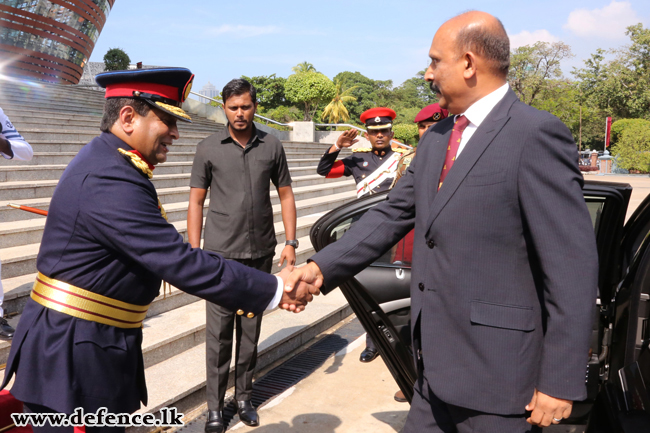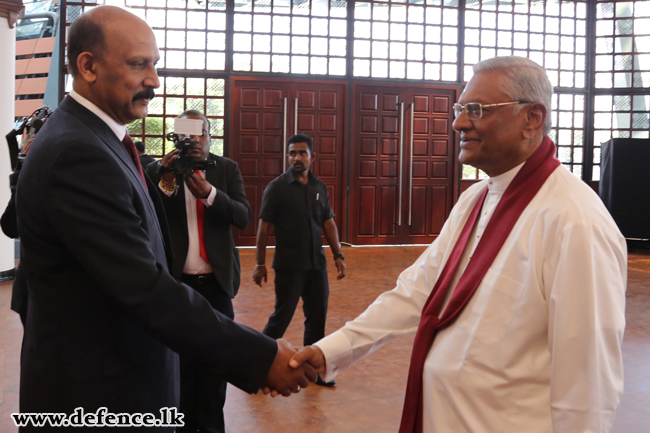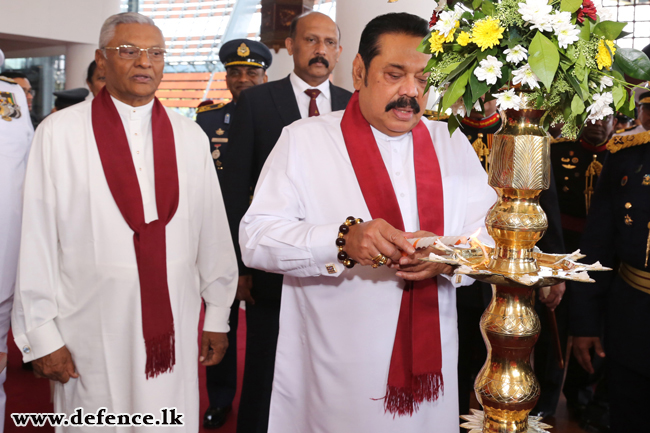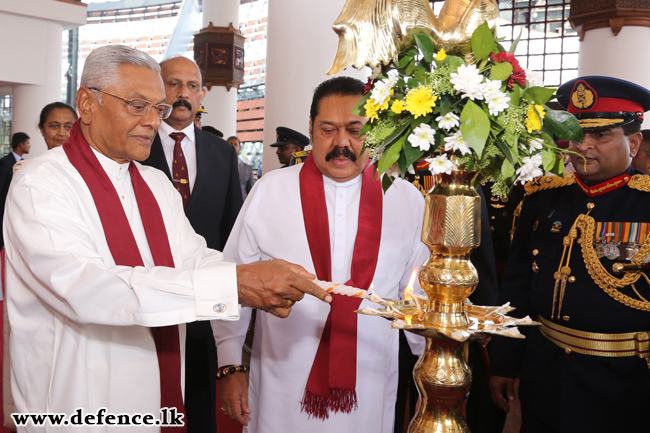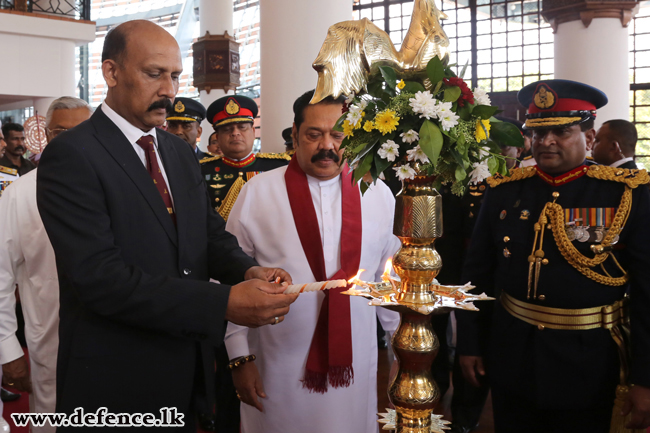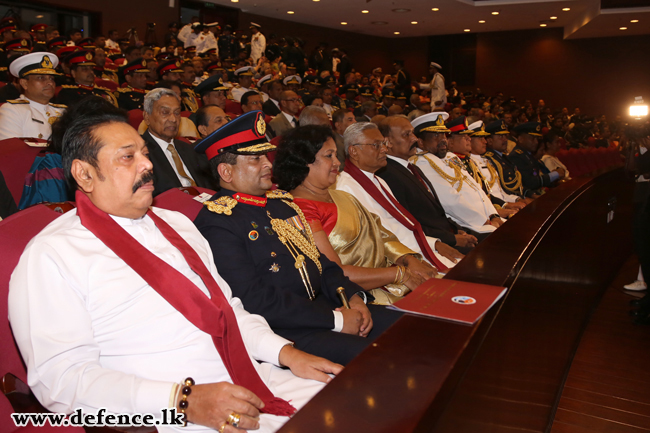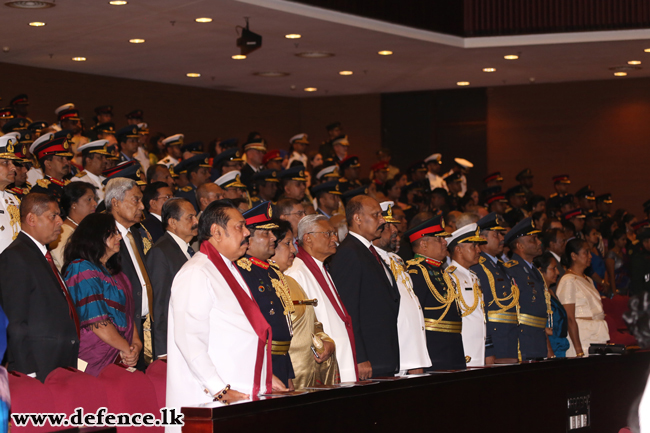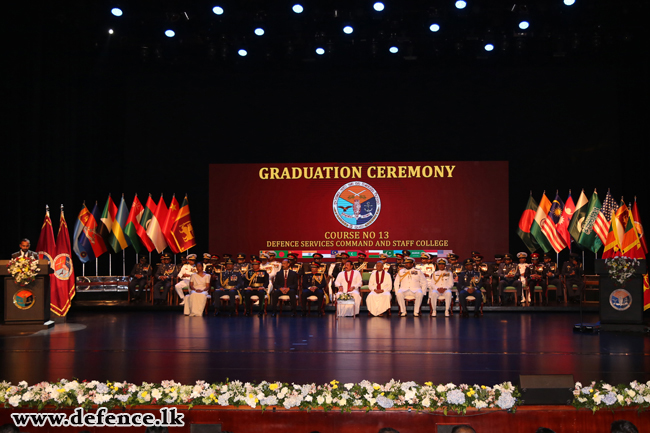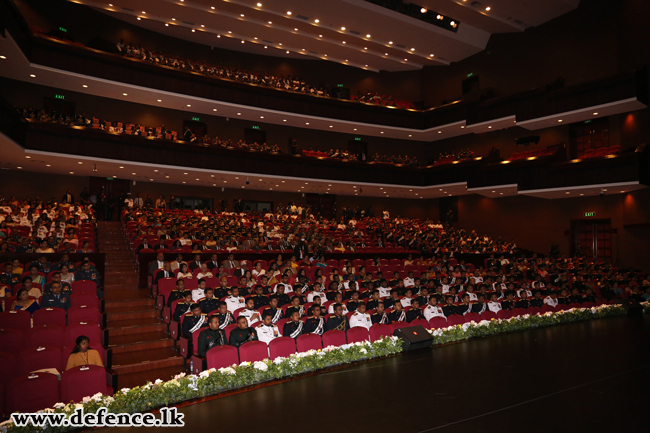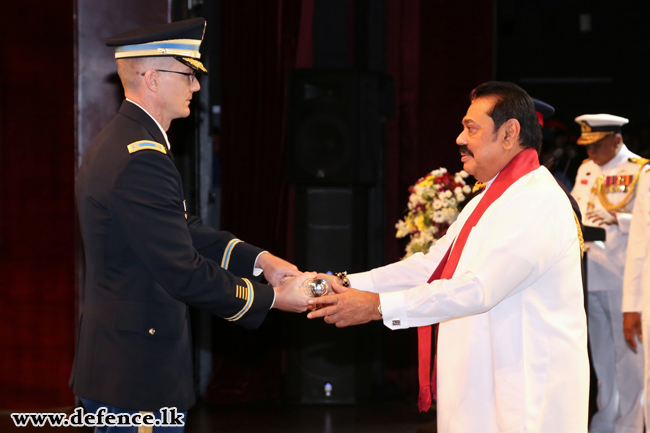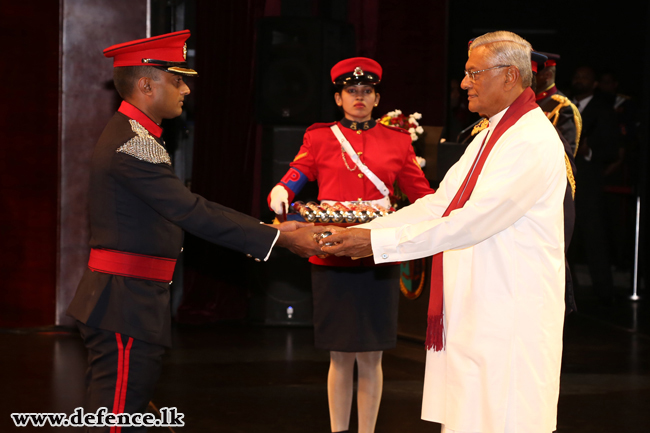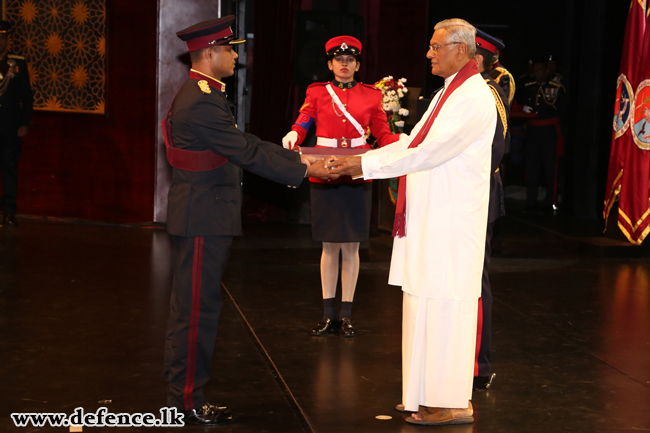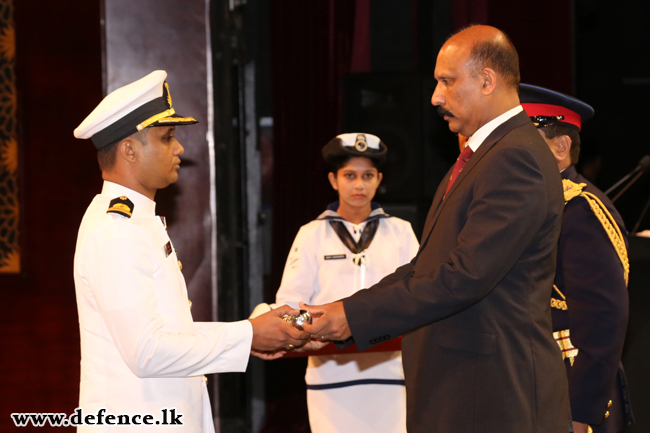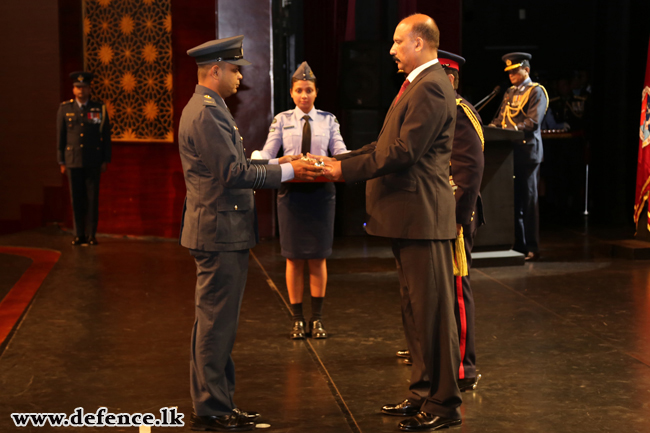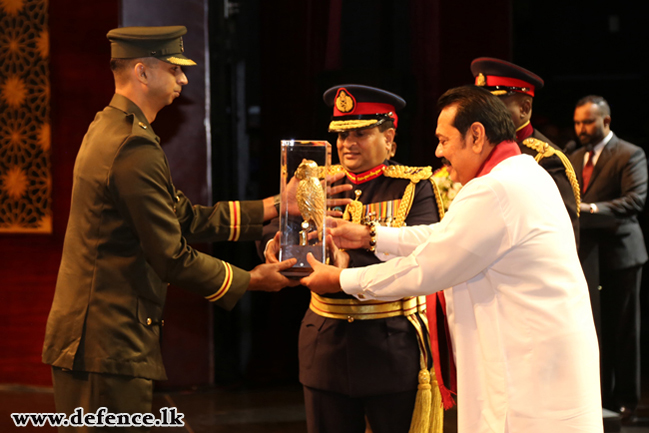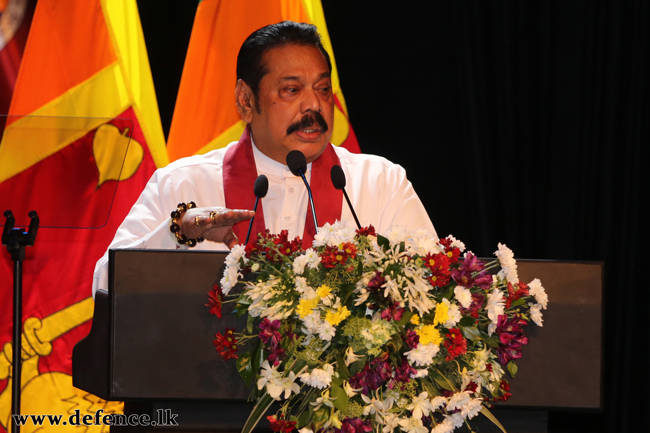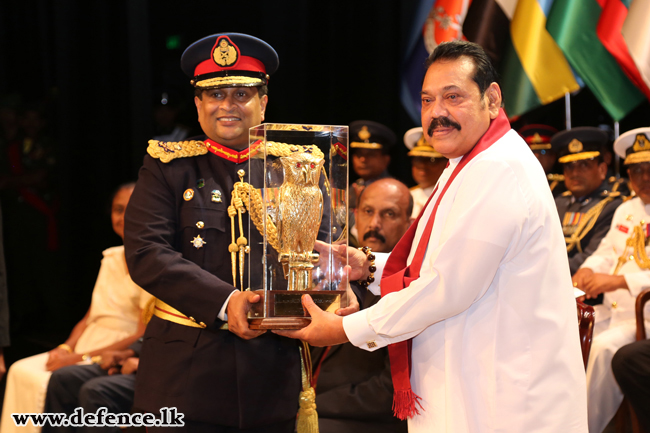The Government will not allow foreign interference - Prime Minister Rajapaksa
December 13, 2019Prime Minister Mahinda Rajapaksa said today that some foreign elements, are trying to interfere into country's internal affairs but the government would safeguard the national sovereignty and national security of Sri Lanka.
"Those foreign elements have objected to certain promotions made by the government within the armed forces trying to interfere. No sovereign country will allow such foreign interference in the internal affairs of its armed forces, " he said.
Speaking at the graduation ceremony of the Defence Services Command and Staff College held at Nelum Pokuna Theatre in Colombo, Prime Minister Rajapaksa said that the government had been elected to safeguard the national sovereignty and national security of Sri Lanka and the government would take all necessary actions to achieve that objective.
He stressed that the new terrorist threat faced by Sri Lanka had to be contained by whatever means necessary with the fullest cooperation of other countries.
"The Easter Sunday bombings was the deadliest terrorist attack on civilian targets to take place anywhere in Asia," he said.
Prime Minister Rajapaksa said even though Sri Lanka was a small country, the challenges that the country had to face including LTTE terrorism, were not small at all.
" We have to take serious note of the fact that while there were no Indians among the 2008 Mumbai attackers, all the Easter Sunday suicide bombers were Sri Lankans,” he said.
Prime Minister also said the new threat would have to be contained not only for Sri Lanka’s sake but for the well-being of all other nations in the region.
“This year, India went on alert on at least two occasions due to information that Islamic terrorists from Sri Lanka were trying to enter India by boat. If we don’t get on top of the situation, all neighbouring countries including India, the Maldives, Bangladesh, and even countries further off like Myanmar, Thailand and Malaysia will be under threat. Countries in our immediate neighbourhood and beyond are well aware of the danger and we can expect their fullest cooperation in this regard,” he said.
He added that unlike the war against the LTTE which required ground, sea and air operations, this new threat at this stage requires mainly intelligence operations but unfortunately over the past five years, the intelligence services were rendered completely inoperative and the members of the intelligence services were persecuted, harassed, and jailed by the previous government on false charges.
"It was not just the intelligence services that had to face this situation. The entire high command of the armed forces during the war against the LTTE was brought before the police with a great deal of media publicity to answer to all kinds of allegations," he noted.
Prime Minister said the war time Defence Secretary, two chiefs of defence staff, two army commanders, four commanders of the navy, two air force commanders, the Chief of National Intelligence and very senior officers of the army, police, STF and navy were among those who were humiliated in this manner while some were even taken to courts and remanded for periods ranging from a few weeks to over one year.
" The idea was to create the impression in the minds of Sri Lankans and the international community that our armed forces were not war heroes but thieves and murderers," he said adding that no government of any country in the world has humiliated its own armed forces in this manner.
"The armed forces are the protectors of the nation. The change of government in January 2015 was almost as if a hostile foreign force had invaded and taken over Sri Lanka. A comprehensive programme was launched to harass and demoralize the armed forces, to intimidate the Maha Sangha and to how the majority community into submission and to obtain through dirty politics what could not be obtained through nearly four decades of civil war," he said.
"All of you are aware of the manner in which the previous government went to the UN Human Rights Council in Geneva and co-sponsored a resolution against Sri Lanka, pledging among other things to institute war crimes trials against members of the armed forces with the participation of foreign judges and prosecutors. That was done by a Sri Lankan government elected by the people. Today, the people of this country have elected a President with an overwhelming mandate, to rectify the injustices of the past five years".
"I take this opportunity to pledge before the armed forces of Sri Lanka that the humiliation and injustices that they were subjected to over the past five years will be rectified and restitution provided where necessary," he said adding that the initiatives will be taken at the international level to restore to our armed forces, the respect and dignity they deserve.
"We all know that there are various agendas at the international level operational with regard to our armed forces. Overcoming the challenge that we were confronted with in the form of the LTTE required military hardware and pitched battles with a terrorist army. The new situation that we are faced with requires intelligence operations, cooperation with international intelligence agencies and certain strategic foreign policy initiatives.
We, the political authorities will provide the armed forces of Sri Lanka with the leadership to achieve the objective of ensuring the national security of a sovereign Sri Lanka. That is our pledge to the armed forces and the people of Sri Lanka," he said.
Wishing those who graduated from the Defence Services Command and Staff College this year, every success, Prime Minister asked the graduates to bear in mind to perform their responsibilities as members of an illustrious military organization that did what was thought impossible and amazed the entire world.
Minister of Mahaweli, Agriculture, Irrigation and Rural Development, Minister of Internal Trade, Food Security and Consumer Welfare and State Minister of Defence Chamal Rajapaksa and Defence Secretary Maj. Gen (Retd) Kamal Gunaratne were also present at the occasion. Commandant of the DSCSC, Maj. Gen DAPN Dematanpitiya received the chief guest and the other guests upon their arrival at the venue.
The Course No 13 of the DSCSC, Sapugaskanda includes 167 officers including 76 Army officers, 33 Navy officers and 30 Air Force officers and also includes military officers from Bangladesh, Nepal, Pakistan, China, India, Indonesia, Maldives, Malaysia, Oman Rwanda Sudan, Saudi Arabia and the USA.
The Ceremony commenced with the observing of a moment of silence as a tribute to the fallen War Heroes. Successful graduates received their parchment from the chief guest while State Minister Chamal Rajapaksa and Defence Secretary also presented the parchments. Special awards were presented by the chief guest.
The annual journal of the DSCSC, ‘The Owlet', was also presented to the guests during the ceremony.
Chief of Defence Staff, Tri Forces Commanders, senior Tri Forces officers and a large number of invitees were also present at the occasion.
The Army Command and Staff College (ACSC), the precursor to the DSCSC was inaugurated in March 1998 with the first course consisting of 26 Student Officers. The ACSC was established with the aim of developing the professional knowledge and understanding of selected Student Officers both in the aspects of command and staff, for the Sri Lanka Army. But a few selected Student Officers from the Sri Lanka Navy and Sri Lanka Air Force were also included in the course. Subsequently the ACSC became the present Defence Services Command and Staff College. In January 2007 the DSCSC Course No 1 commenced with Army, Navy and Air Force Student Officers. In later years, foreign students were also included for the courses.
